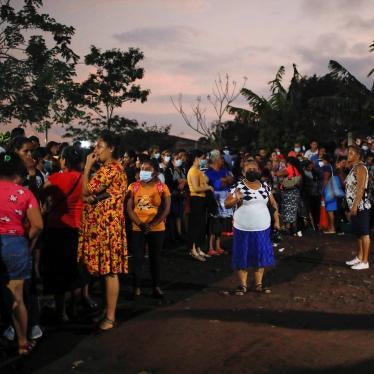President Nayib Bukele took office promising to provide security, after decades of violence and criminality by gangs. In response to a spike in gang violence after he secretly negotiated with them, as El Faro reported, the government adopted a broad state of emergency in late March which has been a disaster for human rights. Thanks to this measure, that remains very popular, Salvadorans continue to live in fear—not only of gangs, but also of the security forces.
Authorities have committed short-term enforced disappearances; arbitrary mass arrests of people with no ties to gangs; and mistreatment, inhumane conditions, and deaths in custody. The measure, meant to be temporary, has been extended five times.
It is easy to see why a majority of Salvadorans support the state of emergency. El Salvador’s homicide rate, although decreasing since 2015, has been among the highest in the hemisphere for years. But tough-on-crime approaches have proven again and again to be ineffective and have at times led to more violence.
President Bukele is using his social media propaganda machine to peddle the tired old story of a “war” on gangs. When authorities use a war narrative for domestic operations, it’s a red flag for excessive use of force, arbitrary prosecutions, and lawmaking that tramples basic rights.
President Bukele’s youthful, personable brand, built on social media and a backward baseball cap, seems to mesmerize many Salvadorans, while he quietly removes critical safeguards.
President Bukele’s crackdown on gangs, with raids in mostly low-income communities and mass incarceration of supposed members, is sadly similar to past security policies. More than 50,000 people have been detained since March—thousands without arrest warrants. To justify the raids, the authorities have described all those netted in mass roundups as gang members who deserve the abuse they receive.
“If you are law-abiding, no worries, you have nothing to fear,” his powerful propaganda machine promises. Yet Human Rights Watch has documented many arrests apparently based solely or largely on people’s age, their appearance, or their residence in a gang-dominated rural or urban neighborhood, factors that have nothing to do with whether they have committed a crime.
Most are languishing in prolonged pretrial detention, with many in overcrowded and unhealthy detention facilities. More than 70 have died in custody. Investigations into their deaths have lacked rigor. The effect on families is devastating. Relatives, mostly women, make the rounds of detention centers, courts and government offices, looking for their missing loved ones.
The families of victims have nowhere to turn, no local government agencies to process complaints and start the wheels turning toward releases—nor prospects of eventual justice and reparations.
Hundreds of people are suffering from abuse. But some groups face heightened risks to their life and health in detention. A particularly egregious example is the people with disabilities. In one case, four months ago, police officers detained a 23-year-old man with autism at his home in a rural community. Authorities accused the man of belonging to a gang and ordered him held in pretrial detention for six months. No one in the family has seen or talked to him since.
People with disabilities are entitled to due process safeguards and what are known as procedural accommodations—in this case to enable him to understand the reason for his detention and his rights—to ensure equality with other detainees. There is no way of knowing if the authorities have fulfilled these obligations in this case or others. Failing to do so puts people with disabilities at risk of abuse.
To seriously address gang violence, the government needs effective security strategies to dismantle criminal groups, as well as sustainable programs to address the structural causes of gang membership. That means creating both jobs for marginalized young people, a way for them to participate fully in society and, when needed, robust rehabilitation programs. The government should train police and prosecutors to enforce the law strictly while rooting out police corruption and ending excessive use of force, so that people come to trust the justice system instead of being afraid of it.
The country has a long history of security force misdeeds, and the rhetoric of “war” is giving security forces a green light to use excessive force and cover up their lawless tactics. The president is using this narrative to justify extending the state of emergency, which has suspended rights to free association and assembly, privacy in communications, and several due process guarantees. The legislature, where he holds a super-majority, has been a cheerleader and enabler of the “war”—and with it, the president’s concentration of power.
Closing democratic spaces, packing the courts, and the increasing opacity of government all amount to a removal of checks on the president’s power.
If it hasn’t happened to anyone you know, it is easy to ignore the arbitrary detentions and associated rights violations of the state of emergency. But unless democracies set limits that reflect universally accepted values, anything goes. And if you have no government institutions to act as a check on executive power, anyone could wake up one day as the target of government repression and possible criminal prosecution. Normalizing living without rights is dangerous for everyone.







